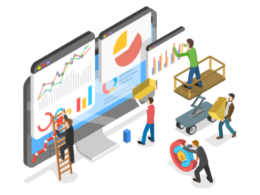Have you ever wondered what separates successful recruitment from the rest?
How do some organizations consistently identify and hire the best talent while others struggle to find the right fit?
In today’s competitive job market, these questions are more pertinent than ever.
Enter HR analytics, the dynamic force that’s transforming the world of recruitment and talent acquisition. It’s not just about collecting data; it’s about harnessing its power to make smarter, more strategic decisions that can redefine your hiring process.
The HR Analytics Revolution
Traditional recruitment methods often rely on a combination of intuition and experience, which can introduce a level of uncertainty into the process. However, HR analytics offers the promise of replacing guesswork with data-backed insights, fundamentally changing the game of talent acquisition.
Let’s delve deeper into this transformative world and explore how HR analytics is reshaping modern HR practices:
1. The Data-Driven Advantage
How can data reshape your hiring strategy?
HR analytics equips recruiters with a wealth of data, enabling them to make informed decisions. By analyzing this data, HR professionals can identify trends, patterns, and candidate preferences, which inform and improve their hiring strategies.
What are the key metrics you should track in recruitment?
Metrics such as time-to-fill (how long it takes to fill a job vacancy), cost-per-hire (the expenses associated with hiring), and quality-of-hire (the effectiveness of hires) are crucial. These metrics provide valuable insights into the efficiency and effectiveness of recruitment efforts, helping organizations refine their strategies.
2. Predictive Analytics for Smarter Decisions
Can you predict candidate success?
Predictive analytics leverages historical data to forecast a candidate’s potential for success within an organization. By analyzing past hiring outcomes and employee performance, HR analytics can help recruiters focus their efforts on applicants with the highest likelihood of success.
How does it mitigate bias in the recruitment process?
HR analytics plays a vital role in reducing unconscious bias by relying on data-driven insights. Algorithms and models can be designed to focus on objective criteria rather than subjective judgments, promoting fairer and more equitable hiring practices.
3. Enhancing the Candidate Experience
Why is a positive candidate experience crucial?
A positive candidate experience is essential because it directly impacts an organization’s ability to attract and retain top talent. HR analytics helps organizations understand the candidate journey, identifying pain points and opportunities for improvement.
How can data-driven insights optimize the application process?
Analyzing candidate feedback and behavior can lead to a more user-friendly and efficient application process. By listening to candidates’ preferences and addressing their concerns, organizations can enhance the overall experience and increase their chances of attracting top talent.
4. Identifying Skill Gaps and Development Needs
How can HR analytics contribute to talent development?
HR analytics enables organizations to analyze existing employee data to identify skill gaps and development needs. This information guides recruitment efforts toward candidates who possess the skills required to fill those gaps.
What role does HR analytics play in succession planning?
Data-driven insights are invaluable in identifying potential leaders within an organization. By analyzing employee performance and potential, HR analytics assists in succession planning, ensuring that the right talent is developed and groomed for future leadership roles.
Navigating the HR Analytics Landscape
To fully leverage HR analytics in recruitment and talent acquisition, organizations need skilled professionals who can harness data effectively. This is where Accredian’s Executive Program in Strategic HR Analytics, in collaboration with IMI, Delhi, comes into play.
In a rapidly evolving HR landscape, staying ahead necessitates expertise in HR analytics. Our program equips you with the knowledge and skills to transform your organization’s recruitment processes and talent acquisition strategies.
As you conclude your journey through this blog, consider the impact of HR analytics on your career and your organization’s success.
 Pin
PinAre you ready to embrace the future of recruitment and talent acquisition?
Your journey to HR analytics excellence begins here!






